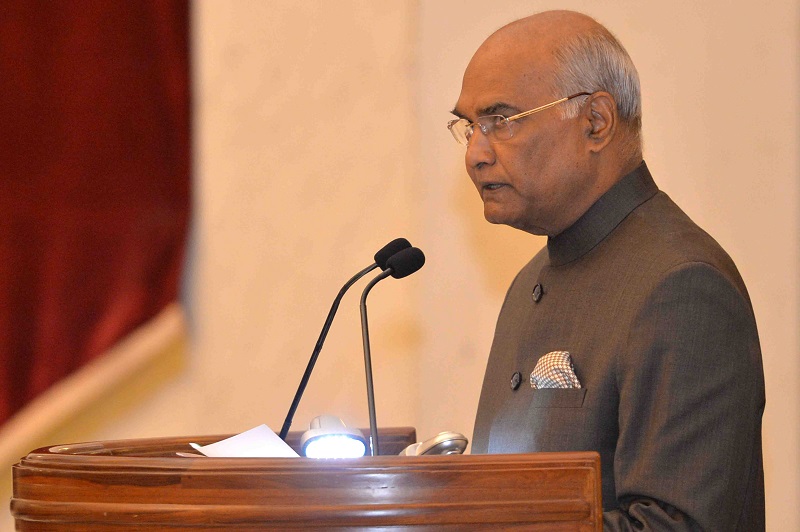ADDRESS BY THE PRESIDENT OF INDIA, SHRI RAM NATH KOVIND ON THE OCCASION OF CALL ON BY THE INDIAN ADMINISTRATIVE SERVICE OFFICERS (2016 BATCH)
Rashtrapati Bhavan : 27.07.2018

1. I welcome the 176 officers of the 2016 batch of the Indian Administrative Service to Rashtrapati Bhavan. I congratulate you on having completed your training, capped by a 13 week posting at the rank of Assistant Secretary in 58 different Ministries and Departments of the government of India. You are now ready to depart for your respective states, and take up your new duties in hundreds of districts that comprise the reality of our country. This is a good moment to look back at your training – as well as plan for your future and for the future of India.
2. The IAS is our premier all-India service. It is one of those institutions that knit together our country with a common governance framework, a shared administrative ethos and by promoting a uniform culture and value system in public service. As IAS officers in the districts and state capitals, you will also be responsible for implementation of national and Union government programmes. These may sometimes be tailored or adapted for local conditions. This makes you an important link between the government of India and the state government. It is incumbent upon you to bring the learning, expertise, experience and of course standards of integrity of an elite all-India service to every rung of government in our very diverse country.
3. Given this, it is important that you understand how the Union government and its Ministries and Departments work even before you leave for your states. This is the exposure that the short period of service as Assistant Secretaries is designed to give you. Since the programme began in 2015, you are the fourth batch of the IAS to benefit from this innovation.
4. पिछले कुछ सप्ताह के दौरान, आपने उन मंत्रालयों के कामकाज और अन्य बारीकियों की जानकारी प्राप्त की होगी जिनमें काम के लिए आपको भेजा गया था। आपने एस्पिरेशनल डिस्ट्रिक्स-आकांक्षी जिलों औरग्राम स्वराज अभियानजैसे मौलिक राष्ट्रीय कार्यक्रमों औरआयुष्मान भारतजैसी प्रमुख सामाजिक पहलों के बारे में जानकारी हासिल की होगी। आपने महसूस किया होगा कि चाहे आप इन कार्यक्रमों से सीधे न भी जुड़े हों तो भी आपके काम-काज पर इनका प्रभाव अवश्य पड़ेगा। [In the past few weeks, you have acquainted yourselves with the workings and details of the Ministries you have been assigned to. You have learnt about crosscutting national programmes such as Aspirational Districts and the Gram Swaraj Abhiyan, and key social sector initiatives such as Ayushman Bharat. As you must have realised, these are programmes that will leave their impact on your work even if you don’t directly deal with them.]
5. Addressing issues of districts that have been left behind in our developmental journey, whether due to infrastructure, social indices or logistical challenges, involves more than one Department or Ministry. Similarly a national health coverage scheme is vital to safeguard our human capital – as a social as well as an economic resource. It is not just a concern for the Department or Ministry of Health.
6. These programmes, along with others such as Make in India, Digital India, the Smart Cities and urbanisation programme, Swach Bharat, the quest for renewable energy, greater integration of technology into agriculture and farm productivity, are ambitious and daring. They constitute a giant leap for our society. These are also programmes that will run in parallel with your professional lives. They will be your legacy.
7. Many of you will end your careers as Secretaries in the 2040s – perhaps at about the time India celebrates the 100thanniversary of Independence. Today we are a US $ 2.5 trillion economy. By the 2040s, our GDP will be six or seven times as large. Few generations in India’s history would have seen such a dramatic transformation. You are destiny’s chosen generation.
8. As IAS officers of your generation, it will be your mandate to equip our people, equip our government and equip our country to deal with the challenges and opportunities of an economy of that size. This will call for enhancing use of technology in the way you work and function. It will call for breaking out of silos and seeing government as a seamless service provider – not as a series of closed compartments. Above all, it will call for a radical overhaul of the nature of administration – and of the interface between citizen and government.
9. This is quite a task. You have no option but to succeed. As you go to your respective districts and become change agents in your state cadres, our country’s future is in your hands. I am confident you will be equal to this responsibility – and I wish you all the best.